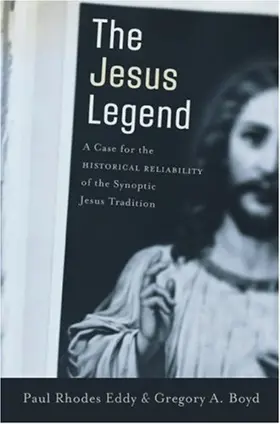

The Jesus Legend: A Case for the Historical Reliability of the Synoptic Jesus Tradition
Pages
480
Publisher
Baker Academic
Published
8/1/2007
ISBN-13
9780801031144
Even mature Christians have trouble defending the person and divinity of Christ. The Jesus Legend builds a convincing interdisciplinary case for the unique and plausible position of Jesus in human history. He was real and his presence on the planet has been well-documented.
The authors of the New Testament didn't plant evidence, though each writer did tell the truth from a unique perspective. This book carefully investigates the Gospel portraits of Jesus--particularly the Synoptic Gospels--assessing what is reliable history and fictional legend. The authors contend that a cumulative case for the general reliability of the Synoptic Gospels can be made and boldly challenge those who question the veracity of the Jesus found there.
Reviews
[Full Review]
The Jesus Legend: A Case for the Historical Reliability of the Synoptic Jesus Tradition Grand Rapids: Baker, 2007. Pp. 479. Paper. $24.99. ISBN 0801031141. Ken Olson Duke University Durham, North Carolina Eddy and Boyd present an extended argument, aimed at the general reader, for the historical reliability of the Jesus tradition as recorded in the New Testament (the book does not limit itself to the Synoptic tradition). It consists of an introduction and ten chapters divided into four parts: (1) “Historical Method and the Jesus Tradition: Miracles, Parallels, and First-Century Palestine”; (2) “Other Witnesses: Ancient Historians and the Apostle Paul”; (3) “Between Jesus and the Gospels: The Early Oral Jesus Tradition”; and (4) “The Synoptic Gospels as Historical Sources for Jesus: Assessing the Evidence.” The argument is proffered against “skeptics” of the Jesus tradition, a category that includes not just Jesus-mythers from outside the field, such as G. A. Wells or Earl Doherty, but also many (most?) major New Testament scholars, including Rudolf Bultmann, J. D. Crossan, Werner Kelber, and even Rudolf Pesch. On the nonskeptical side, N. T. Wright, James Dunn, and Richard Bauckham are frequently and favorably cited. The rhetorical strategy of the book is to advance the historical reliability of the New Testament traditions about Jesus as a default position and to call into question the reasons that have been given for doubting it. Each of the chapters concentrates on arguing against a view that is, once was, or is perceived by the authors to be common in New Testament scholarship.
[Full Review]

